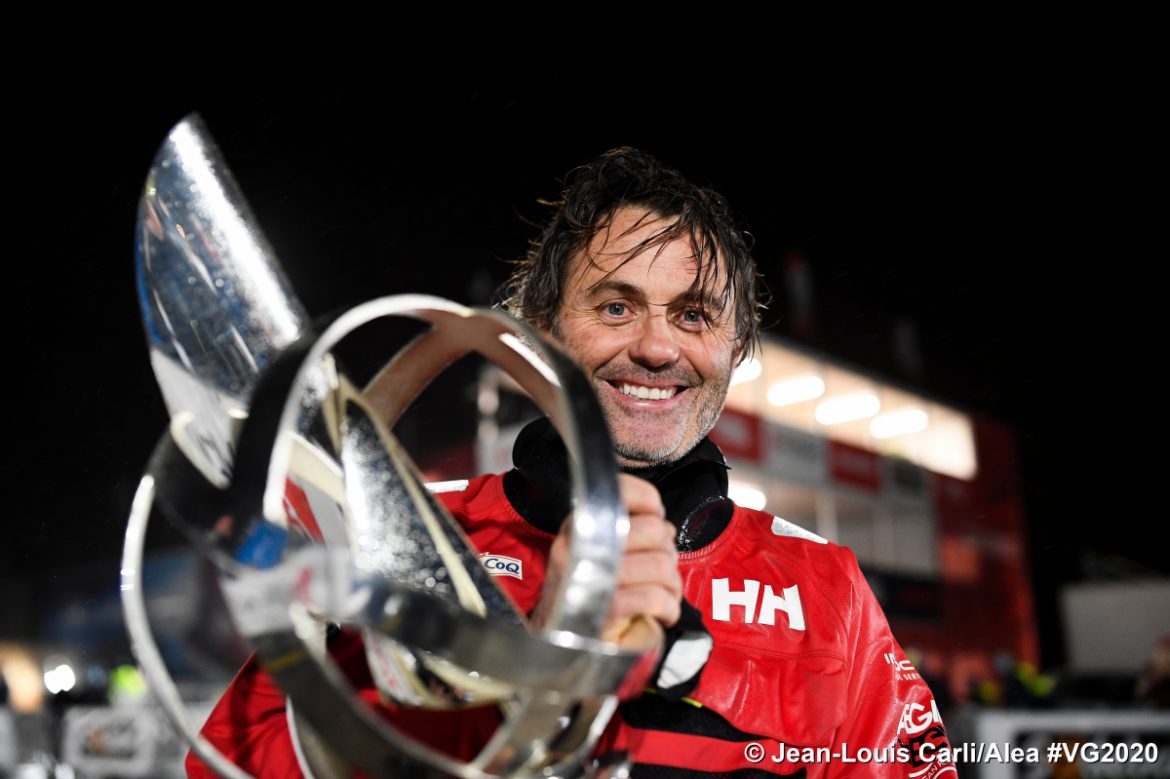The Vendée Globe Race has kept us thrilled and on the edge of our seats from day one. After 81 days at sea, Yannick Bestaven, the 48 year old French skipper of Maître Coq IV, is the overall winner of the ninth edition of the Race. He crossed the line in third place off Les Sables d’Olonne, France at 03hrs 19mins 46 secs early this morning. However, he took overall victory because of the time compensation he received of 10 hours and 15 minutes. This was awarded for his role in the search and rescue of fellow competitor Kevin Escoffier. The final time has him ahead of Charlie Dalin by 2hrs 31mins 01secs and 6hrs 40mins 26secs ahead of Louis Burton.
The skipper of Maître CoQ IV was one of the two skippers who led the fleet for the longest time: 26 days, or 32% of the race.
‘My main quality? “Stubbornness”. My main flaw “Stubbornness”. “I am also very resilient ” admitted Bestaven before the start.
A dark horse
Although he was not tipped as a possible winner of the race, Bestaven revealed himself as an outstanding performer during his first time in the southern oceans, but he was at his best in the Indian Ocean. He passed Australia’s Cape Leeuwin in third place and then emerged first at Cape Horn with a 15 hour lead.
After building the biggest margin of the race, 440 hard earned miles thanks to a smart climb up the South Atlantic, During three frustrating days all but becalmed south of Rio, he saw this margin evaporate.Bestaven must have thought his chances of winning this Vendée Globe were over.
Bestaven is from La Rochelle on the west coast of France and is an engineer as well as professional skipper. He proved his race-winning credentials as he fought back into contention at the Azores. His final, key move proved to be choosing to head north in the Bay of Biscay, which allowed him to arrive on the heels of a low pressure system and accelerate faster on a long, direct track into Les Sables d’Olonne.
Over an ocean racing career spanning nearly 20 years, Bestaven has tasted success by winning the Mini-Transat in 2001. He also won twice with the Class 40 in the Transat Jacques Vabre. Bestaven was one of the first to be forced out of the 2008 Vendée Globe when he was dismasted on the Bay of Biscay less than 24 hours into the race. He has taken his time to return to the Vendée Globe with a well appointed programme, with a small, hand picked team of specialists from all areas of sailing, including the America’s Cup. He is also a successful entrepreneur who owns and runs Watt & Sea, developing hydro-generators fitted to most of the competing IMOCAs.
Maitre Coq IV, the 2015 VPLP-Verdier designed boat built as Safran, is not one of the latest generation foilers. However, he was still able to maintain high average speeds in the south, remaining competitive in more moderate conditions.
A difficult race
The ninth edition of the race saw a record entry of 33 skippers. The race has been marked by complicated weather patterns for both the descent down and the ascent back up the South Atlantic. This included a regrouping of the leading pack in a persistent period of light winds early in the Pacific, and again off Rio de Janeiro, Brazil.
Difficult, short, crossed sea conditions in the Indian Ocean meant the newest and most powerful latest-generation foilers could not sail to their full speed potential. And two of them, Thomas Ruyant’s LinkedOut and Charlie Dalin’s Apivia both suffered different damage to their foil systems, which compromised their speed potential on the starboard tack.
The most dramatic moments of the race came on the 22nd day of racing, November 30th when PRB the third placed Kevin Escoffier broke up suddenly 640 miles SW of Cape Town.
Recourse awarded
Escoffier was forced to abandon ship and climb into his life-raft. Four skippers were asked to reroute to help locate and rescue Escoffier. Although 61 year old veteran Jean Le Cam was first on the scene and got close to Escoffier, it was only 11 ½ hours later when Le Cam was finally able to rescue the stricken skipper from his life-raft.
The international jury announced their time compensations on December 16th. Germany’s Boris Herrmann was awarded 6 hours, Bestaven was awarded 10hrs and 15 mins, Le Cam received 16hrs and 15 mins. No one would have known then that this redress would decide the final winner in one of the closest finishes in history. The first three skippers crossed the line in less than eight hours of eachother.
Germany’s Boris Herrman was in contention for a podium position until he struck a fishing boat at 90 miles from the finish line. He is sailing Seaexplorer-Yacht Club de Monaco to the finish at a reduced speed.
Podium positions
First: – Maître Coq IV (Yannick Bestaven), finished 28/01/2021 03:19:46 UTC, elapsed time 80d 13h 59min 46s. Time compensation : -10h 15min 00s, Offical corrected time : 80dj 03h 44min 46s.
Average speed on the theoretical course: 24 365.74 nm / 12.60 kts.
Miles sailed 28 583.80 nm at an average of 14.78 nds
Second: – APIVIA (Charlie Dalin) finished 27/01/2021 19:35:47 UTC. elapsed time 80d 06h 15min 47s
no time compensation. Time difference to first 02h 31min 01s
Average speed on the theoretical course: 24 365.74 nm / 12.65 nds
Miles sailed 29 135.01 nm at an average of 15.13 nds
Third: – Bureau Vallée 2 (Louis Burton) finished 27/01/2021 23:45:12 UTC elapsed time 80d10h 25min 12s, no compensation. Time difference to first 06h 40min 26s, time difference to APIVIA 04h 09min 25s
Average speed on the theoretical course: 24 365.74 nm / 12.62 nds
Miles sailed 28 649.99 nms at an average of 14.84 nds


